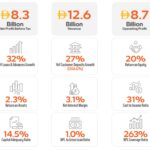Security Paper Limited (PSX: SEPL) has announced a stunning increase in earnings, which came to Rs 746 million in the first half of the fiscal year 2023–24—a remarkable 122% increase over the same time the previous year (SPLY). The company’s earnings per share (EPS) has increased significantly from Rs 5.67 in SPLY to Rs 12.59 now, reflecting its financial performance.
Security Papers Limited (SPL) had significant growth in sales, with a 38% increase in the top line to reach Rs 3.49 billion from Rs 2.53 billion in SPLY. The company’s gross profit increased by 82% to Rs 976 million despite a 26% increase in the cost of sales to Rs 2.51 billion. SPL’s remarkable financial results can be ascribed to its strategy emphasis on augmenting sales, broadening its clientele, optimizing operating expenses, and enacting advantageous modifications.
Chairman Mohammad Aftab Manzoor highlighted the company’s dedication to progress and providing value to customers and shareholders, expressing joy at the exceptional performance. He underlined the benefits of SPL’s diversification efforts, unwavering emphasis on new projects, and strategic vision, all of which have contributed to the company’s EPS more than doubling.
Manzoor expressed optimism about SPL’s success going forward, pointing in particular to the recently completed technical consulting deal with a top European security paper company. The purpose of this agreement is to create detailed plans for cost and efficiency reduction and to benchmark SPL’s operational efficiencies. The chairman’s positive outlook on upcoming projects demonstrates a dedication to ongoing expansion and innovation.
Security Paper Limited has demonstrated its adaptability and resilience in a competitive market by its strong financial performance. The organization is positioned as a major participant in the sector by its strategic objectives, dedication to efficiency, and emphasis on client satisfaction. SPL is well-positioned to sustain its value delivery to its stakeholders, given its optimistic outlook and continuous efforts to improve operational efficiencies.







